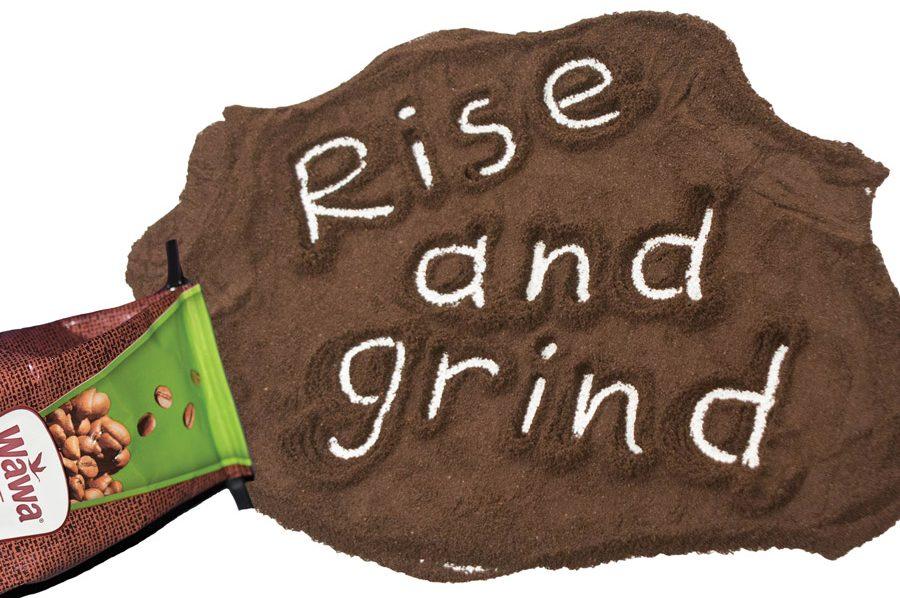Rise and grind
Students rely on coffee to get through the day, but what are the consequences?
Senior Carly Schofield grabs her backpack and rushes to her car. The clock is ticking, and there are only 15 minutes before school begins. Schofield is stuck at a crossroad. Wawa is in one direction, while school is in the other. Immediately, she knows what to do. She may be late to school, but at least she will have her coffee.
Coffee is a source of energy for people who cannot cope with early mornings. However, many individuals drink coffee during all hours of the day to help them get through their daily activities. “I absolutely rely on coffee. If I didn’t have it, I would have horrible migraines and probably punch someone in the face,” Schofield said.
Schofield began drinking coffee freshman year to help energize herself and to become more productive. She drinks two cups of coffee at 8 a.m. and one at 8 p.m. According to Schofield, she drinks coffee at night to help her stay awake to work on homework.
Other students have found coffee helpful for improving their athletic performance. Senior Emma Gromacki regularly drinks a cup of coffee before her field hockey practices. “[Coffee] helps with my performance. Being a goalie, it makes my reaction time quicker,” Gromacki said.
Diana Sugiuchi, a Registered Dietician Nutritionist at Nourish Family Nutrition – a health counseling service – confirms that in moderation, coffee could potentially benefit athletic activities. “A cup of coffee before going for a run or something can help your performance, but what happens is, if you do it constantly, then your tolerance builds up over time and you need more and more,” Sugiuchi said.
In a manner similar to Schofield, Gromacki began drinking coffee freshman year. Gromacki wakes up at 5:30 a.m. to her first cup of coffee, then at 6:30 a.m., she has her second. After school she has her third, and she finally has her fourth cup before practice.
Gromacki prefers getting her daily caffeine from coffee, rather than energy drinks or sodas. “I drink black coffee and it’s pretty healthy for you – there’s no extra fat or sugar. With other caffeinated drinks like Mountain Dew and Red Bull, there’s a lot of artificial stuff and sugar. I’m just not into that,” Gromacki said.
Sophomore Madelyn Cumpston began drinking coffee at a younger age than most people. “In Pre-K, I would finish the rest of my mom’s coffee when she got up almost every day because I loved the taste, and when she got back we would laugh about it, then she would make more,” Cumpston said.
According to Cumpston, she began regularly drinking coffee for the taste in sixth and seventh grade. When freshman year came along however, her love for coffee was not her only purpose to drink it. “Freshman year is when I started drinking it everyday not just because I liked it, but because I needed it too,” Cumpston said.
Responses to a Patriot survey revealed that many avid coffee lovers can reach a consensus that without coffee, they would experience lower performance rates, headaches, sleepiness, and even sometimes anger. According to Schofield, if she does not have coffee on a school day, she struggles to stay awake in classes and has trouble focusing.
Other students utilize coffee to help them improve their performance at work. Junior John Kyburz drinks a cup of coffee before work three times a week. “I work at Toys R Us, and there is a lot of social interaction to be had. Trying to talk to people on a six-hour shift is tough with or without coffee. Coffee just makes it easier,” Kyburz said.
U.S. History teacher Darrion Siler can commonly be spotted with his trademark thermos. Siler drinks up to 12 cups of black coffee per day. “I like the taste. I started drinking coffee late high school and early college. I also drank it because I needed to study and not be asleep all day,” Siler said.
The reliance and consumption of a caffeinated beverage like coffee is prevalent among many individuals. Although it helps people feel ready to tackle their daily activities, health concerns arise from the potential caffeine addiction these people face. “We definitely see more people who are trying to withdraw from the sugar, not only the caffeine, so that’s an issue. It definitely is an addictive substance,” Sugiuchi said.
As with everything, moderation is key when it comes to drinking coffee. According to Sugiuchi, an occasional cup of coffee can help you feel more attentive while not harming your health.
However, if you’re looking to kick your coffee addiction, there are ways to obtain energy that are healthier options. “Have a snack. One of the reasons that people drink coffee is to get energy, and if you are eating regular food throughout the day, you are going to get your energy through foods. Don’t have a lot of sugary food. Instead have a piece of fruit and get your energy from food rather than coffee,” Sugiuchi said.
Erin McCloskey is a Community Editor for The Patriot and jcpatriot.com.



